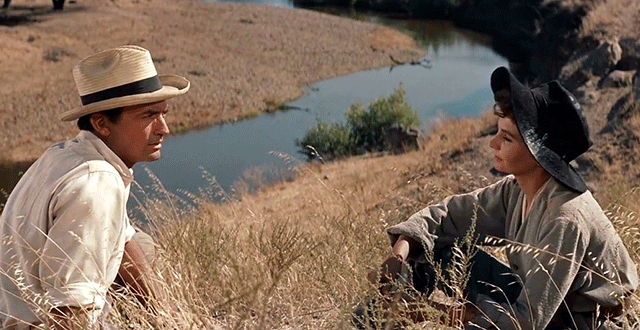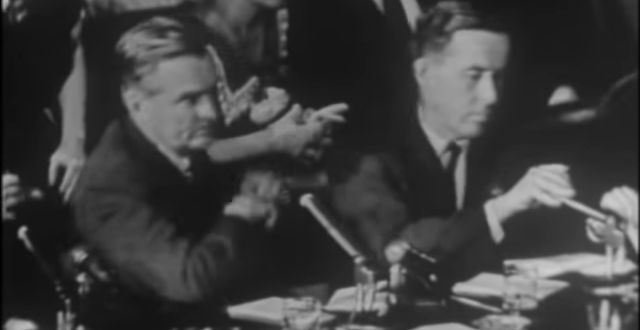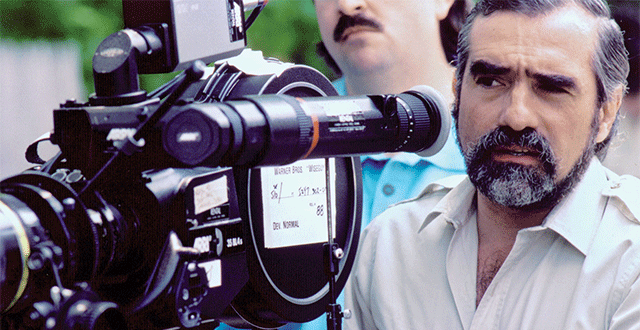News
COMMEMORATING 30 YEARS OF TFF
The Film Foundation has facilitated the restorations of five films by William Wyler, including one of his greatest (and one of the greatest, by anyone anywhere), Dodsworth. I wanted to focus on The Big Country because I’ve always found it underrated and because the circumstances of its creation provide a vivid snapshot of big-budget American moviemaking in the late 50s, as well as an equally vivid contrast with the world of cinema as it is now. Wyler had just directed live television for the first and last time, and he and his friend/star/co-producer Gregory Peck were eager to create a big screen movie epic. They shot in Technirama, a sort of anamorphic version of VistaVision. They developed a story about a liberal, educated easterner landing in the world of rival ranching families in a state of perpetual war—a meditation on manhood and the stark contrast between reason and inner fortitude on the one hand and blood-fueled and grievance-driven action and reaction on the other. Wyler and Peck chose locations that allowed them to shoot on an immense scale. As it sometimes happened in Hollywood, they went into production without a finished script, which meant a swelling budget and mounting tensions of all shapes and sizes on the set. Jean Simmons remembered learning her lines, then being given all new pages that she had to stay up all night memorizing, then arriving on location the next morning to find that the scene had been re-written once again. Carroll Baker’s Actor’s Studio training was sometimes at odds with Wyler’s method of directing. Peck insisted on retakes that Wyler refused to execute and they stopped speaking. In the end, Wyler left for Rome to make Ben-Hur and turned over all of post-production and even the shooting of a new ending to his editor Robert Swink. When the film was released it did moderately well, but it was thought of as something of a letdown. Looking at the Academy restoration today, within the context of this moment, when the difference between cinema and episodic television and all kinds of other audiovisual stuff has to be clarified and proudly proclaimed once more, and when blind passions and willful ignorance of scientific fact have put the country in real danger, The Big Country seems movingly grand and eloquent, kind of imperfect but generous, ample, and grounded in a belief in the very best in us.
- Kent Jones
Follow us on Facebook, Instagram, and Twitter!
DODSWORTH (1936, d. William Wyler)
Restored by the Academy Film Archive and The Film Foundation, in association with the Samuel Goldwyn Jr. Family Trust. Funding provided by the Hobson/Lucas Family Foundation.
THE BIG COUNTRY (1958, d. William Wyler)
Restored by Academy Film Archive with funding provided by The Film Foundation.
COMMEMORATING 30 YEARS OF TFF
Point of Order, released in 1964 and restored by UCLA with the help of The Film Foundation, is a 97-minute distillation of 188 hours of the Senate Army-McCarthy Hearings, which were nationally televised from April to June of 1954. The film began as an idea in the head of Dan Talbot, the proprietor and programmer of the New Yorker Theater and later the founder of New Yorker Films. Dan had been mesmerized by the original broadcasts and wondered about the possibility of running kinescopes of the hearings at the New Yorker and charging a dollar an hour. He brought up the idea with his friend Emile de Antonio and they decided to make a film. Through a process of trial and error and the help of a young editor named Robert Duncan, they created a documentary without commentary, whose force—the film has the relentless momentum of Full Metal Jacket or There Will Be Blood—and considerable dramatic tension emerge from a grounding in character, body language, and emotional conflict. In other words, the filmmakers looked at the footage, they saw the drama, and they extracted it. And they created a dynamically political film, a clarifying vision of the politics of one historical moment—McCarthy’s populism, fueled by the craven Roy Cohn, coming head to head with the liberalism of Boston lawyer Joseph Welch and Missouri Senator Stuart Symington. It’s the same drama that has played out, in different forms and with different characters, over and over again in this country since the end of World War II—the latest version is raging at this very moment. Point of Order is a riveting film, and it is essential viewing. I look forward to the day when it will serve not as a reminder of an earlier iteration of a conflict that we keep reliving, but as a document of a time gone by.
- Kent Jones
Follow us on Facebook, Instagram, and Twitter!
POINT OF ORDER (1964, d. Emile de Antonio)
Preserved by UCLA Film & Television Archive with funding provided by The Film Foundation.
Martin Scorsese's Ten Favourite Films
From Ashes and Diamonds to BlacKkKlansman
Martin Scorsese is not only one of the greatest living film directors of our time, but also an avid cinephile. His non-profit organization Film Foundation is dedicated to restore rare classics. His educational documentaries including “A Personal Journey with Martin Scorsese Through American Movies” reflect his deep love and passion for film history. Here are the director’s favourite ten films in no particular order:

8½ (1963)
A harried movie director retreats into his memories and fantasies.
Director: Federico Fellini

The Haunting (1963)
Hill House has stood for about 90 years and appears haunted: its inhabitants have always met strange, tragic ends. Now Dr. John Markway has assembled a team of people who he thinks will prove whether or not the house is haunted.
Director: Robert Wise

Ashes and Diamonds (1958)
As WWII and the German occupation ends, the Polish resistance and the Russian forces turn on each other in an attempt to take over leadership in Communist Poland.
Director: Andrzej Wajda

The Exorcist (1973)
When a 12 year-old girl is possessed by a mysterious entity, her mother seeks the help of two priests to save her.
Director: William Friedkin

Rebel Without a Cause (1955)
A rebellious young man with a troubled past comes to a new town, finding friends and enemies.
Director: Nicholas Ray

The Leopard (1963)
The Prince of Salina, a noble aristocrat of impeccable integrity, tries to preserve his family and class amid the tumultuous social upheavals of 1860's Sicily.
Director: Luchino Visconti

BlacKkKlansman (2018)
Ron Stallworth, an African American police officer from Colorado Springs, CO, successfully manages to infiltrate the local Ku Klux Klan branch with the help of a Jewish surrogate who eventually becomes its leader. Based on actual events.
Director: Spike Lee

Woman Is the Future of Man (2004)
Two college friends get together and reminisce on the woman they both fell in love with at different times in their past, and are thus propelled to find her.
Director: Sang-soo Hong

One-Eyed Jacks (1961)
After robbing a Mexican bank, Dad Longworth takes the loot and leaves his partner Rio to be captured but Rio escapes and searches for Dad in California.
Director: Marlon Brando

2001: A Space Odyssey (1968)
After discovering a mysterious artifact buried beneath the Lunar surface, mankind sets off on a quest to find its origins with help from intelligent supercomputer H.A.L. 9000.
Director: Stanley Kubrick
COMMEMORATING 30 YEARS OF TFF
I don’t remember the first Albert Lewin film I saw or how old I was when I saw it, but I was immediately entranced. I was taken with his literate and touchingly formal approach to moviemaking, his moving adherence to and belief in high culture and its trappings, his powerful sense of myth, his exacting production design, and his pull toward brooding and meditative quietude. He shared many of these qualities with Val Lewton. Both men had come out of the studio system and served as right-hand men to superstar production executives—Lewton worked for David O. Selznick, Lewin for Irving Thalberg—and both of them went in far more individualistic directions than their former mentors. And apart from the respective levels of their budgets and shooting schedules, there was one crucial difference. Lewton exerted a powerful and unmistakable influence on each of the films he produced, but he never directed. He preferred to stay in the background. Lewin also produced some truly beautiful films, but when he became a director, he declared himself as an artist. You can hide as a producer. But to quote David Fincher, if you think you can hide as a director, you’re nuts. The mythic undertones and overtones, the swooning romanticism, the idiosyncratic and occasionally awkward grammar and pacing—he unashamedly owned all of it.
The Film Foundation has helped to facilitate the restorations of three films directed by Lewin—The Moon and Sixpence, The Private Affairs of Bel Ami, and his greatest, the hypnotic and throbbingly beautiful Pandora and the Flying Dutchman—in addition to So Ends Our Night, a lovely adaptation of Erich Maria Remarque’s Flotsam. I like to celebrate Lewin, because his films are very special to me, and because at this particular moment in our culture, when people are so cavalier about shutting the door on the past, they seem particularly fragile. To see the films of the past only through the lens of the present, as opposed to allowing every film to fully reveal itself and thereby illuminate the moment of its making, is a great sadness. Especially when it’s used as a means of marginalizing such soulful films.
- Kent Jones
Follow us on Facebook, Instagram, and Twitter!
THE MOON AND SIXPENCE (1942, d. Albert Lewin)
Preserved by George Eastman Museum in association with Crystal Pictures and The Film Foundation.
THE PRIVATE AFFAIRS OF BEL AMI (1947, d. Albert Lewin)
Preserved by UCLA Film & Television Archive with support from The Film Foundation.
PANDORA AND THE FLYING DUTCHMAN (1951, d. Albert Lewin)
Restored by George Eastman Museum in cooperation with The Douris Corporation. Funding provided by The Film Foundation, the Rome Film Festival, and the Franco-American Cultural Fund, a unique partnership between the Directors Guild of America (DGA), the Motion Picture Association of America (MPAA), the Société des Auteurs, Compositeurs et Editeurs de Musique (SACEM), and the Writers Guild of America, West (WGAW).
SO ENDS OUR NIGHT (1941, d. John Cromwell)
Preserved by George Eastman Museum with funding provided by The Film Foundation.




